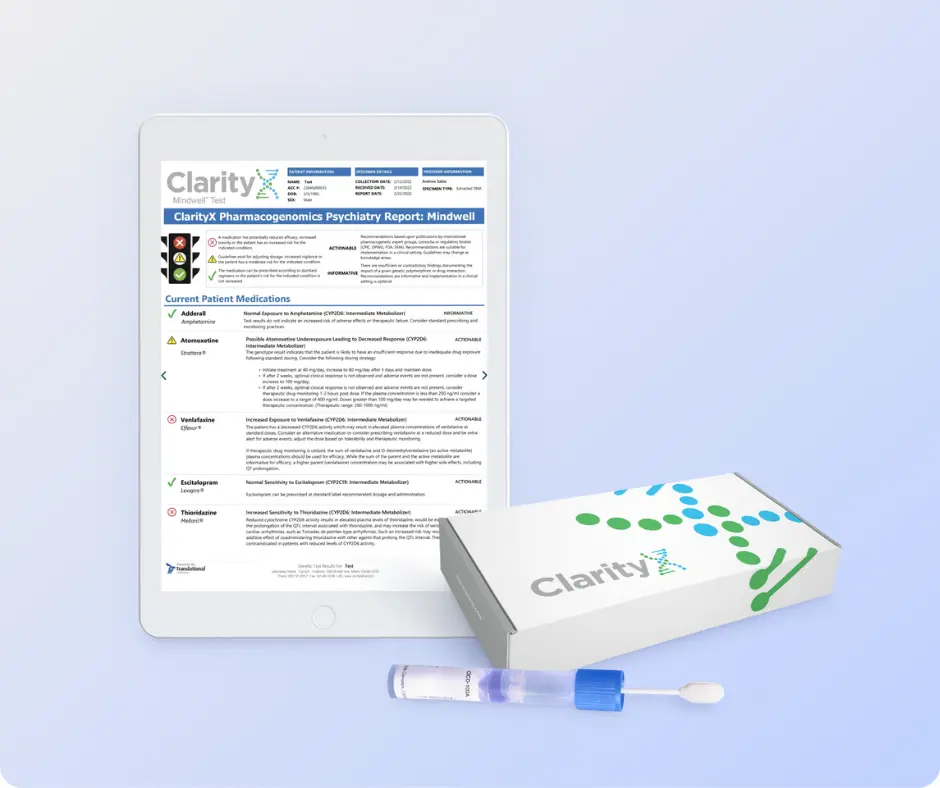Recently, doctors have been placing a higher emphasis on taking care of mental wellness. While mental health conditions have been around for ages, they’ve seen an increase since the COVID-19 pandemic. Due to social distancing and quarantine regulations, an increasing number of people have reported experiencing things like stress, anxiety, and major depressive disorder. If you’re going through one of these mental health conditions, it’s important not to suffer in silence and seek help. When left unaddressed, mental health symptoms can begin to negatively impact all elements of daily living (school, work, personal interests, and social relationships).
The good news is, that there are medications available to use along with therapy to alleviate the debilitating effects of psychiatric conditions. However, the most common process used when selecting medications to treat mental health conditions is the trial-and-error approach. A provider simply tries one drug and if it doesn’t work or it results in giving their patient side effects, they simply move on to the next drug. This is not only inefficient, but it also incurs an unnecessary cost, potential side effects, and wasted time for all involved. Pharmacogenomic (PGx) testing can help improve a patient’s mental health journey by providing insight into how they may respond to medications based on their genetics. This tailored approach to selecting medications based on a patient’s PGx testing result can help providers select the right medication from the start.
Introduction
Fluoxetine (Prozac) and escitalopram (Lexapro) both belong to a class of antidepressants called selective serotonin reuptake inhibitors (SSRIs), which work by increasing the amount of serotonin in the brain by 60 to 80%. Serotonin has been shown to affect the brain in the following areas: mood, emotions, appetite, digestion, and sleep. Increasing serotonin in the brain helps to significantly improve one’s mood. SSRIs are frequently used antidepressants due to their effectiveness, tolerability, and low likelihood of overdosing and are commonly used to treat mental health conditions like major depressive disorder, generalized anxiety disorder, obsessive-compulsive disorder, and post-traumatic stress disorder.1
Prozac vs Lexapro Label Indications & Off-Label Uses
Fluoxetine (Prozac) and escitalopram (Lexapro) may function similarly; however, they may have different mental health conditions they are labeled to treat. The following chart below indicates what Prozac and Lexapro are indicated to treat and their off-label uses.2 3
| Labeled Indications | Off-Label Uses | |
| Fluoxetine (Prozac) | Bipolar major depression; Bulimia nervosa; Major depressive disorder; Obsessive-compulsive disorder; Panic disorder; Premenstrual dysphoric disorder, Treatment-resistant depression | Binge eating disorder; Body dysmorphic disorder; Fibromyalgia, refractory; Generalized anxiety disorder; Posttraumatic stress disorder; Premature ejaculation; Selective mutism; Social anxiety disorder |
| Escitalopram (Lexapro) | Major depressive disorder; Generalized anxiety disorder | Binge eating disorder; Body dysmorphic disorder; Bulimia nervosa; Obsessive-compulsive disorder; Panic disorder; Posttraumatic stress disorder; Premature ejaculation; Premenstrual dysphoric disorder; Vasomotor symptoms associated with menopause |
Prozac vs. Lexapro Formulations & Dosage Amounts
When prescribing either Prozac or Lexapro, the first thing doctors will consider is the dosage amount. There are several factors that may influence your prescribed dosage amount, such as the following: age, weight, medical conditions, other medications being used, and the condition being treated. In the following chart, you'll find information regarding the different dosages and formulations available. Keep in mind that this is a general outline, and the real amounts vary depending on each individual.
| Recommended starting dose (Major depressive disorder) | Recommended starting dose (Generalized anxiety disorder) | Available dosage forms | |
| Fluoxetine (Prozac) | 20mg/day (max: 80mg/day) | 10-20mg/day (max: 60mg/day) | Tablet, oral solution, capsule |
| Escitalopram (Lexapro) | 10 mg/day (max: 20 mg/day) | 10 mg/day (max: 20 mg/day) |
It’s important to emphasize that this chart is a general guideline and the precise dosage amounts vary from person to person. Several factors such as age, lifestyle habits, and medication use can influence your recommended dosage. For example, children or people using other medications may be prescribed lower doses than the average adult. Receiving the right dosage amount for your needs can go a long way in preventing adverse effects.4
Prozac vs Lexapro Common Side Effects
Since selective serotonin reuptake inhibitors (SSRIs) influence the neurotransmitters in your brain, there's always the risk of side effects. Ideally, they should diminish over the course of 4 to 6 weeks. Let's go over some adverse effects you may experience while taking these drugs.
According to product labeling, it has been clinically observed that 10% of patients experienced the following side effects while taking Prozac: nausea, dizziness, drowsiness, changes in appetite, increased sweating and decreased libido. In rare cases, Prozac may increase your risk of irregular heartbeat, hallucinations, or serotonin syndrome. 6
According to product labeling, it has been clinically observed that 10% of patients experienced the following side effects while taking Lexapro: nausea, diarrhea, headache, ejaculatory disorder, and drowsiness. In rare cases, Lexapro can cause abnormal dreams, weight gain, and irregular heartbeats. Substances like alcohol, CBD, NSAIDs, opioids, and muscle relaxants can increase the likelihood of side effects and potentially lead to hospitalization. 7
When taking Prozac or Lexapro, you should avoid using antiplatelet drugs like NSAIDs (ibuprofen, naproxen, and aspirin), and blood thinners (warfarin). This combination can increase the risk of serious bleeding and bruising. You should also avoid combining monoamine oxidase inhibitors (MAOIs), which when combined with Prozac or Lexapro can cause serotonin syndrome. Keep in mind that both Prozac and Lexapro can last in your system for a few weeks, even after you've stopped taking them. Always consult a doctor before adding or discontinuing a new drug to your regimen.
Prozac vs Lexapro Drug Metabolism
Of course, every patient has their own experience with medications. Some may experience many side effects, while others respond without any issues. Many times, drugs are directly impacted by enzymes (CYP450 enzymes) that are responsible for eliminating or activating them in the body. An individual’s genetics can affect the CYP450 enzyme’s ability to metabolize drugs. Let’s take a look at some examples of how this can affect Prozac and Lexapro in the body.
Fluoxetine (Prozac) is primarily metabolized by CYP2C19 and CYP2D6. However, CYP2D6 is its major metabolizing contributor in the body. Prozac is unique in that generally it is not affected by genetic variations of the enzyme CYP2D6. However, Prozac can inhibit CYP2D6 from breaking down other medications in the body. For example, when combining Prozac with other medications metabolized by CYP2D6 (tricyclic antidepressants, antipsychotics, and antiarrhythmics), it can affect how those medications are eliminated from the body. Therefore, this can produce unwanted side effects with those combinations of medicines with Prozac.8
Escitalopram (Lexapro) is also metabolized by CYP2C19 and CYP2D6. However, CYP2C19 is the primary enzyme that Lexapro uses when being eliminated from the body. For example, in a person who genetically is found to have the poor metabolizing function of CYP2C19, this can significantly slow the breakdown of Lexapro in the body. This can lead to a buildup of the drug in the body and produce unwanted side effects or adverse events (hospitalizations). Conversely, if a person’s genetics indicates that CYP2C19 has an ultra-rapid metabolizing function, this can ultimately remove Lexapro from the body too quickly to have any benefit.9
ClarityX Pharmacogenomic (PGx) Testing
Currently, the only definitive way to decide between Prozac and Lexapro was to take one of the drugs, then wait to see the results. If it proved ineffective, the doctor might choose to increase the dosage. If it caused severe side effects, they might decrease the dosage or switch to another drug.
Pharmacogenomic (PGx) testing lets you skip this time-consuming trial-and-error process by immediately identifying which drug can work better for you based on your unique genetics. Not only will it help you decide between medications, but it can also help with selecting the optimal dosages.
So, how exactly does a PGx test work? It starts by analyzing the genetic material available in your DNA. More specifically, it examines the genetic variations in enzymes in the body that metabolize (eliminate or activate) drugs. If your test results reveal that you break down certain drugs too slowly (poor metabolizer) or quickly (ultra-rapid metabolizer), your healthcare provider will be better informed on how to adjust your medications or simply avoid them.
ClarityX has a unique mental health PGx test called Mindwell that can help provide information on treatments designed for mental health conditions, including antidepressants, antipsychotics, and anxiolytics. The Mindwell test provides a seamless in-home testing experience. Simply visit the website clarityxdna.com, select the Mindwell test option from the drop-down menu, and complete the checkout process. Once the kit is received follow the package instructions, perform a simple cheek swab, then mail the sample back using the prepaid envelope. The sample is then sent to the lab for processing and the results are posted in the online patient portal for easy access by the patient or provider in 7-14 days on average.
One of the most important facts about pharmacogenetic (PGx) testing is the results can be reevaluated for future medication changes as this test does not have to be repeated for those specific genes tested. Another key function of the Mindwell test is that 130 specific medications for depression, anxiety, and ADHD can be entered to be evaluated to see how an individual’s genetic makeup can affect those drugs. Pharmacogenetic (PGx) testing can provide a lifetime of knowledgeable decisions about medication selection for healthcare teams.
When trial and error isn’t practical or simply too time-consuming and inconvenient, pharmacogenetic (PGx) testing for mental health medications can help providers prescribe proper dosages and determine which drugs will have the most benefit or potentially cause the most side effects. Having the proper mental health medication along with its appropriate dosage can have a huge impact on those with mental illnesses. It’s well documented that antidepressants can take up to four to six weeks before they provide any relief to mental health conditions like depression. More often than not patients will stop taking antidepressants usually within a few months because of negative side effects or the medication wasn’t working at all to resolve their symptoms. Patient’s abruptly stopping their mental health medications can produce other problems on top of their current mental health diagnosis such as withdrawal symptoms. Many of these complications can be avoided by simply having knowledge of how a patient uniquely reacts to mental health medications.
Citations
1 Selective serotonin reuptake inhibitors: Pharmacology, administration, and side effects. UpToDate. (n.d.). Retrieved May 16, 2022, from https://www.uptodate.com/contents selective-serotonin-reuptake-inhibitors-pharmacology-administration-and-side-effects#H399779781
2 Fluoxetine: Drug information. UpToDate. (n.d.). Retrieved May 25, 2022, from https://www.uptodate.com/contents/fluoxetine-drug-information?search=fluoxetine&source=panel_search_result&selectedTitle=1~148&usage_type=panel&kp_tab=drug_general&display_rank=1#F172690
3 Escitalopram: Drug information. UpToDate. (n.d.). Retrieved May 25, 2022, from https://www.uptodate.com/contents/escitalopram-drug-information?source=auto_suggest&selectedTitle=1~1---1~4---lexapro&search=lexapro
4 Fluoxetine: Drug information. UpToDate. (n.d.). Retrieved May 25, 2022, from https://www.uptodate.com/contents/fluoxetine-drug-information?search=fluoxetine&source=panel_search_result&selectedTitle=1~148&usage_type=panel&kp_tab=drug_general&display_rank=1#F172690
5 Escitalopram: Drug information. UpToDate. (n.d.). Retrieved May 25, 2022, from https://www.uptodate.com/contents/escitalopram-drug-information?source=auto_suggest&selectedTitle=1~1---1~4---lexapro&search=lexapro
6 Fluoxetine: Drug information. UpToDate. (n.d.). Retrieved May 25, 2022, from https://www.uptodate.com/contents/fluoxetine-drug-information?search=fluoxetine&source=panel_search_result&selectedTitle=1~148&usage_type=panel&kp_tab=drug_general&display_rank=1#F172690
7 Escitalopram: Drug information. UpToDate. (n.d.). Retrieved May 25, 2022, from https://www.uptodate.com/contents/escitalopram-drug-information?source=auto_suggest&selectedTitle=1~1---1~4---lexapro&search=lexapro
8 Annotation of FDA Label for fluoxetine / olanzapine and CYP2D6. PharmGKB. (n.d.). Retrieved May 25, 2022, from https://www.pharmgkb.org/labelAnnotation/PA166104788
9 Annotation of CPIC Guideline for escitalopram and CYP2C19. PharmGKB. (n.d.). Retrieved May 25, 2022, from https://www.pharmgkb.org/chemical/PA10074/guidelineAnnotation/PA166127638





